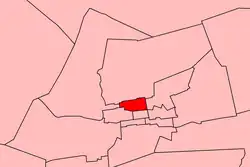Hospital (House of Assembly of South Africa constituency)
| Hospital | |
|---|---|
| Hospitaal | |
| Former constituency for the South African House of Assembly | |
 Location of Hospital within Johannesburg (1915) | |
| Province | Transvaal |
| Electorate | 10,877 (1961) |
| Former constituency | |
| Created | 1915 |
| Abolished | 1966 |
| Number of members | 1 |
| Last MHA | Alec Gorshel (UP) |
| Created from | Braamfontein |
Hospital (Afrikaans: Hospitaal) was a constituency in the Transvaal Province of South Africa, which existed from 1915 to 1966. It covered parts of the inner northern suburbs of Johannesburg surrounding the Johannesburg Hospital complex and the University of the Witwatersrand. Throughout its existence it elected one member to the House of Assembly and one to the Transvaal Provincial Council.
Franchise notes
When the Union of South Africa was formed in 1910, the electoral qualifications in use in each pre-existing colony were kept in place. In the Transvaal Colony, and its predecessor the South African Republic, the vote was restricted to white men, and as such, elections in the Transvaal Province were held on a whites-only franchise from the beginning. The franchise was also restricted by property and education qualifications until the 1933 general election, following the passage of the Women's Enfranchisement Act, 1930 and the Franchise Laws Amendment Act, 1931. From then on, the franchise was given to all white citizens aged 21 or over. Non-whites remained disenfranchised until the end of apartheid and the introduction of universal suffrage in 1994.[1]
History
Like most of Johannesburg's northern suburbs, Hospital had a largely English-speaking and liberal electorate. It was held throughout its existence by the main pro-British party in South Africa, first the Unionists, then the South African Party and finally the United Party. The one brief exception was the 1953-58 term, during which sitting MP Arthur Barlow was expelled from the United Party for proposing a compromise with the government over the Coloured vote question. He joined the National Conservative Party, a conservative split from the UP, and left parliament at the next election, which was again won handily by the UP candidate.
Members
| Election | Member | Party | |
|---|---|---|---|
| 1915 | H. B. Papenfus | Unionist | |
| 1920 | |||
| 1921 | SAP | ||
| 1924 | |||
| 1929 | Robert Hugh Henderson | ||
| 1933 | |||
| 1934 | United | ||
| 1938 | |||
| 1943 | A. G. Barlow | ||
| 1948 | |||
| 1953 | |||
| 1954 | NCP | ||
| 1958 | Boris Wilson | United | |
| 1961 | Alec Gorshel | ||
| 1966 | Constituency abolished | ||
Detailed results
Elections in the 1910s
Elections in the 1920s
| Party | Candidate | Votes | % | ±% | |
|---|---|---|---|---|---|
| South African | H. B. Papenfus | 734 | 35.4 | −31.1 | |
| Labour | John Christie | 556 | 26.8 | +9.1 | |
| Unionist | J. Weightman | 428 | 20.6 | New | |
| National | M. Reiseberg | 355 | 17.1 | +1.3 | |
| Majority | 950 | 8.6 | −40.2 | ||
| Turnout | 2,073 | 65.6 | −9.7 | ||
| South African hold | Swing | -20.1 | |||
| Party | Candidate | Votes | % | ±% | |
|---|---|---|---|---|---|
| South African | H. B. Papenfus | 1,412 | 68.5 | +33.1 | |
| National | R. L. Weir | 648 | 31.5 | +14.4 | |
| Majority | 764 | 37.0 | N/A | ||
| Turnout | 2,060 | 62.5 | −3.1 | ||
| South African hold | Swing | N/A | |||
References
- ^ "EISA South Africa: Historical franchise arrangements". Eisa.org.za. Archived from the original on 9 May 2013. Retrieved 6 July 2012.
- ^ Schoeman, B.M. (1977). Parlementêre verkiesings in Suid-Afrika 1910-1976. Pretoria: Aktuele Publikasies.
- ^ Standard Encyclopaedia of Southern Africa (1972). "House of Assembly" (vol. 5, pp. 617–636). Cape Town: Nasionale Opvoedkundige Uitgewery (Nasou).